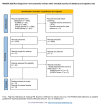Fecal Microbiota Transplantation Role in the Treatment of Alzheimer's Disease: A Systematic Review
- PMID: 36381829
- PMCID: PMC9637434
- DOI: 10.7759/cureus.29968
Fecal Microbiota Transplantation Role in the Treatment of Alzheimer's Disease: A Systematic Review
Abstract
Alzheimer's, a neurodegenerative disease that starts slowly and worsens progressively, is the leading cause of dementia worldwide. Recent studies have linked the brain with the gut and its microbiota through the microbiota-gut-brain axis, opening the door for gut-modifying agents (e.g., prebiotics and probiotics) to influence our brain's cognitive function. This review aims to identify and summarize the effects of fecal microbiota transplantation (FMT) as a gut-microbiota-modifying agent on the progressive symptoms of Alzheimer's disease (AD). This systematic review is based on the Preferred Reporting Items for Systematic Reviews and Meta-Analyses (PRISMA) 2020 guidelines. A systematic search was done using Google Scholar, PubMed, PubMed Central, and ScienceDirect databases in June 2022. The predefined criteria upon which the studies were selected are English language, past 10 years of narrative reviews, observational studies, case reports, and animal studies involving Alzheimer's subjects as no previous meta-analysis or systematic reviews were done on this subject. Later, a quality assessment was done using the available assessment tool based on each study type. The initial search generated 4,302 studies, yielding 13 studies to be included in the final selection: 1 cohort, 2 case reports, 2 animal studies, and 8 narrative reviews. Our results showed that FMT positively affected AD subjects (whether mice or humans). In humans, the FMT effect was measured by the Mini-Mental State Examination (MMSE), showing improvement in Alzheimer's symptoms of mood, memory, and cognition. However, randomized and nonrandomized clinical trials are essential for more conclusive results.
Keywords: alzheimer's disease; alzheimer’s dementia; animal studies; cognitive abilities; fecal microbiota transplant; gut microbiome; gut-brain connection; memory issues; neurodegenerative disesase; short-chain fatty acids.
Copyright © 2022, Nassar et al.
Conflict of interest statement
The authors have declared that no competing interests exist.
Figures




References
-
- Oligomeropathies and pathogenesis of Alzheimer and Parkinson's diseases. Forloni G, Artuso V, La Vitola P, Balducci C. https://movementdisorders.onlinelibrary.wiley.com/doi/10.1002/mds.26624. Mov Disord. 2016;31:771–781. - PubMed
-
- A critical appraisal of amyloid-β-targeting therapies for Alzheimer disease. Panza F, Lozupone M, Logroscino G, Imbimbo BP. https://www.nature.com/articles/s41582-018-0116-6. Nat Rev Neurol. 2019;15:73–88. - PubMed
-
- The impact of the microbiota-gut-brain axis on Alzheimer's disease pathophysiology. Doifode T, Giridharan VV, Generoso JS, et al. https://www.sciencedirect.com/science/article/pii/S1043661820316224?via%.... Pharmacol Res. 2021;164:105314. - PubMed
-
- Microbiology of regressive autism. Finegold SM, Downes J, Summanen PH. https://www.sciencedirect.com/science/article/abs/pii/S1075996411002423?.... Anaerobe. 2012;18:260–262. - PubMed
Publication types
LinkOut - more resources
Full Text Sources
Miscellaneous
